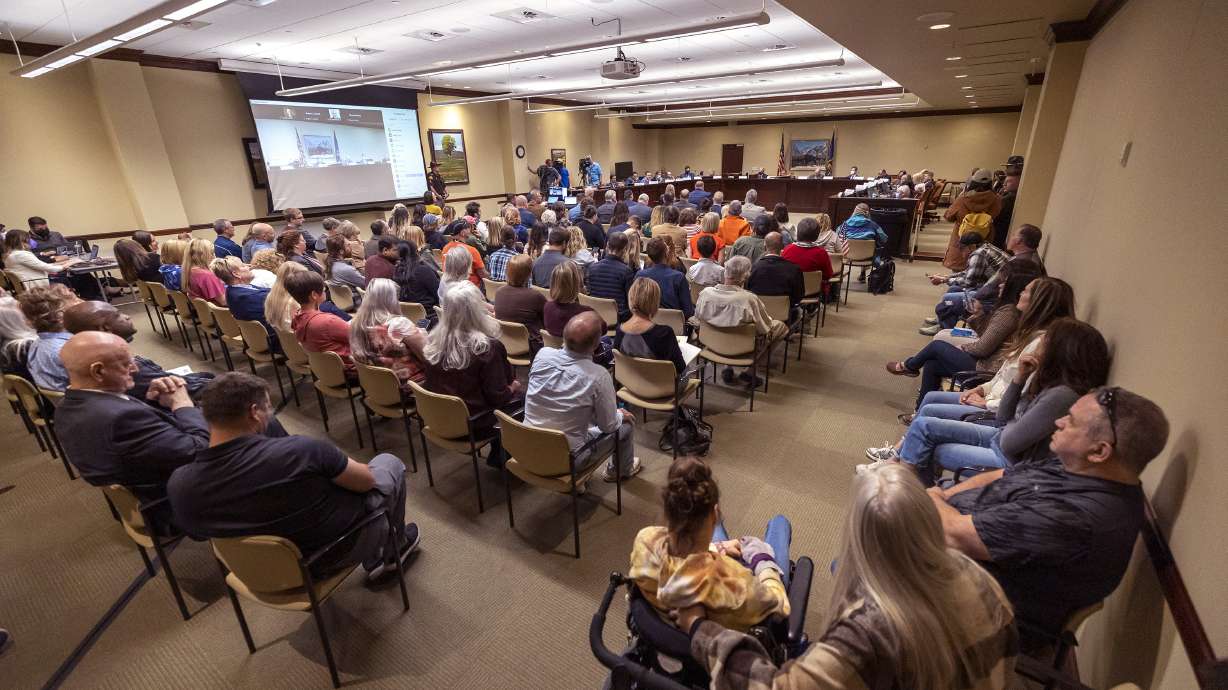Estimated read time: 4-5 minutes
This archived news story is available only for your personal, non-commercial use. Information in the story may be outdated or superseded by additional information. Reading or replaying the story in its archived form does not constitute a republication of the story.
SALT LAKE CITY — As many Utah politicians prepare for legal battle against President Joe Biden's plan to require COVID-19 vaccination or weekly testing for most businesses across the U.S., Utah companies are trapped in political limbo.
Biden's directive, put in place to curb the spread of the highly contagious COVID-19 delta variant both in and outside of the workplace, requires that companies with more than 100 employees mandate that employees either get vaccinated or do weekly COVID-19 testing.
Businesses that don't comply could face fines of up to $14,000 per violation. However, businesses that do instate a vaccine requirement risk backlash, like protests outside their establishments, like the Salt Lake City restaurant The Bayou, and a small portion of workers deciding to quit rather than get vaccinated.
Here's what some businesses in Utah have decided to do in the meantime:
Big companies
Big companies with a Utah presences like Adobe, Goldman Sachs, Facebook and Deloitte are requiring vaccinations for employees and people who go inside their facilities.
Food provider giant Tyson Foods, which has a plant in Eagle Mountain, announced last week that its work force had reached a 91% vaccination rate since the requirement they put in place in early August.
Walmart, CVS and McDonald's already have a vaccine requirement implemented at least on a corporate level or for consumer-facing roles.
Government and military
Biden's plan requires that all federal government offices and contractors be vaccinated with no weekly test option. This applies to some of Utah's biggest employers like Hill Air Force Base, L-3 Harris Communication Systems and Northrup Grumman.
Northrop Grumman, the biggest government contractor in Utah's defense industry, notified employees that they have until Dec. 8 to be vaccinated. This has led to employee protests outside the company's facilities in states like Florida and West Virginia. Employees at the IRS office in Ogden have also held protests multiple times.
Events
Some venues such as Sundance and USANA Amphitheater have already put vaccination requirements in place for both staff and attendees.
The Utah Jazz and Vivint Smarthome Arena recently announced that fans would have to show proof of vaccination or a negative COVID-19 test in order to attend in person. The Jazz also announced that their whole roster had been vaccinated.
Universities
Almost all of Utah's major universities have a vaccination requirement, at least for students, but not necessarily for faculty and staff. The following Utah schools have a vaccine requirement:
- University of Utah
- Utah State University
- Utah Valley University
- Weber State
- Salt Lake Community College
- Westminster College
- Davis Technical College
Brigham Young University has a mask requirement in place and "strongly encourages" vaccination.
Southern Utah University, Dixie State University and Snow College are the only public universities that haven't instituted a vaccination requirement.
Airlines
All major airlines, including those with large presences in Salt Lake City — like American Airlines and Southwest — now have a vaccine requirement, except Delta. Delta, which has more than 3,000 employees in Utah, will charge unvaccinated employees $200 per month.
Smaller Utah-based airlines like SkyWest and Breeze are waiting to see how Biden's mandate will play out before they make a decision.
Precedent for vaccination requirements in the workplace
Deseret Digital Media, the parent company of KSL.com, last week announced a vaccination requirement for employees, with an option to do weekly testing instead of vaccination. However, vaccine requirements for employment are hardly new, and some companies have been requiring that employees receive vaccinations, including seasonal flu shots, in order to protect the rest of the company's employees.
Private companies have more flexibility when it comes to vaccine mandates. Employers are legally allowed to require vaccinations as long as they allow for exemptions in compliance with the Americans with Disabilities Act and the 1964 Civil Rights Act.
Utah-based tech darling Qualtrics released a study in March showing that the majority of employees across the country support requiring vaccination, according to their data, which surveyed more than 1,000 people. However, a follow-up survey this month shows that almost a quarter of employees would strongly consider leaving their place of employment if their bosses mandated vaccines.
And more than half of tech workers would consider leaving their jobs if vaccine mandates were not in place, which is particularly relevant in a tech industry-heavy state like Utah.
Companies are stuck in the middle, knowing that they will likely lose employees in the thick of a nationwide labor shortage by making any definitive decision, so most are coming up with a solution that is somewhere in between.
"As companies look to the future, they need to capture insights to help them determine how to reopen offices, implement safety measures and gauge employee and customer comfort with vaccine mandates," said Jay Choi, chief product officer for Qualtrics.
"Our study found that two out of three workers say they would support vaccine mandates, while more than half say they are more likely to support companies that require employees to be vaccinated. Insights like these are good for business and help companies deliver better experiences in the future of work."










